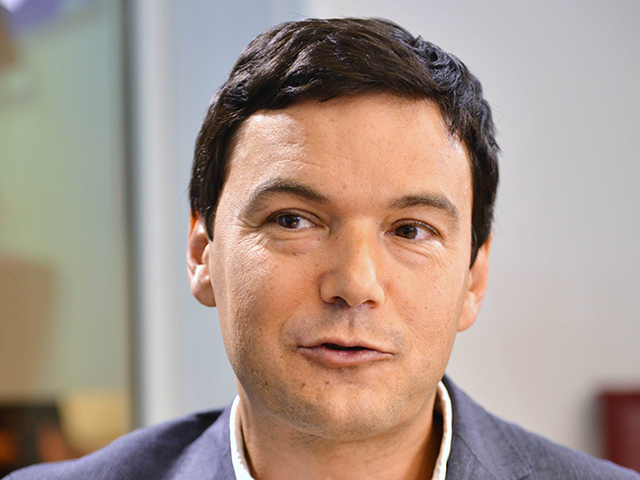One oddity of the current economic debate is that the more Barack Obama’s incompetent income-redistribution policies have failed, the more the left calls for more government-intervention policies to correct for the deficiencies of the earlier rounds. American middle-income families have lost nearly $3,000 in purchasing power since 2007, and the left’s only solution to get us out of the rut is more debt, more social-welfare spending, more income redistribution and higher taxes on the rich and big business.
That’s the conclusion of French economist Thomas Piketty, whose new book called Capitalism in the 21st Century is suddenly the new rallying cry of the redistributionists. One reason the book is garnering so much attention is that the slow economy of late has meant that everyone is fighting over a smaller share of a smaller pie. The New York Times piled on this week, moaning that the middle class in the U.S. has fallen behind the middle class in Canada. The Times never mentions that Canada has cut tax rates, balanced its budget, and tamed government spending.
In any case, the theme of the Piketty book is much like what George W. Bush famously declared during the 2008 financial meltdown: We need to suspend capitalism in order to save it.
Piketty’s primary advice is that America adopt much higher tax rates — as high as 80% on millionaires — as a way to prevent hoarding of wealth and funding a more supersized social-welfare state.
He recommends that a wealth tax of 10% or 20% or 30% would also help spread America’s wealth around. He assures readers that all this can be done without harming growth or injuring the entrepreneurial spirit — which he acknowledges is essential for prosperity.
Of course these policy prescriptions aren’t new or untested. What Piketty is arguing for is that the U.S. be more like … well, France, actually. If only Francois Hollande were president of the U.S., or better yet, New York Mayor De Blasio, everything would be better.
By the way, even France hasn’t raised tax rates as high as Piketty recommends.
Piketty could also profit from a history lesson. We have had high tax rates of 70% and 80% in the U.S., and they didn’t create the days of wine and roses for the middle class. When the tax rate hit 90% in the early 1960s, it was President Kennedy who argued for cutting the rates to grow the economy. Ronald Reagan made the same case in the 1980s. These tax-rate cuts were followed by two epic periods of prosperity in America. And tax payments by the rich soared when tax rates came down. This was just as JFK and the Gipper predicted.
These tax-rate reductions also inspired other nations around the globe to cut tax rates, in large part because capital and jobs were leaving high-tax-rate nations — especially in Europe — and migrating to low-tax-rate nations. This is why nearly 100 nations cut business and or personal income-tax rates over the last 30 years. Even Hollande of socialist France abandoned his call for an 80% tax on the wealthy, because the wealthy were threatening to leave en masse.
Piketty concludes that tax rates of 80% on capital and the super-rich won’t deter growth, because as long as the business owner can make a positive return on the investment, he or she will keep investing. So in other words, investors will invest at the same pace whether their after-tax return is 80 cents on the dollar or 20 cents on the dollar.
Except in the real world, that doesn’t happen. Work effort goes down when the government takes more of your money, not up. Investment goes down when the return goes down. Only someone who has never actually run a business misunderstands this simple concept. When tax rates rise, investment capital flees to where the after-tax returns are higher. We know this within the U.S. — for example, by comparing the divergent growth rates in booming Texas, with a zero income tax, and floundering New York, with a 9% tax rate.
A flat tax of, say, 18% to 20% would likely, by contrast, supercharge the economy. It would bring capital and jobs back to the U.S. Lowering tax rates on investment would increase middle-class incomes by making the economy more productive.
That the left has come full circle to celebrating the confiscatory tax rates of the bad old days of the 1970s is a depressing reminder that liberals really haven’t learned much of anything over the last 30 years. In the 1970s, by the way, the combination of high tax rates and high inflation ended with the worst losses in middle-class incomes since the Great Depression. If U.S. politicians are dumb enough to take Piketty’s advice, a depression is just where the U.S. economy is headed.
Originally published in Investor Village.























